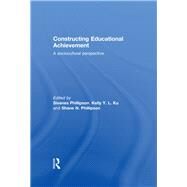- ISBN: 9780415517126 | 0415517125
- Cover: Nonspecific Binding
- Copyright: 4/18/2013
International attention in the scholastic achievement of school pupil's continues to grow. This attention is fuelled by worldwide evaluations of scholastic performance using tests such as TIMSS, PISA and PIRLS. For example, the results of the most recent Programme for International Student Assessment (PISA) showed that 15 year-old pupils from Shanghai outperformed all other pupils in reading, maths and science. This result is all the more remarkable given that this was the first time that pupils from this city were included in the assessment. International interest focuses on the reasons why pupils from East-Asia tend to outperform pupils from the West. Scholars have proposed a number of possible explanations to account for these international trends, such as differences in economics and systems of education. More than ever, however, scholars are realizing that the explanations are likely to be found in the complex interactions between the child and the environment and that the interactions vary with the cultural context. Vygotsky's (1978) socio-cultural theory deems that in order to understand a child's psychosocial development we need to consider the interactions between the child and the child's environment, stressing that to investigate this development, "we need to concentrate not on the product of development but on the very process by which higher forms are established...". These processes refer to the sociocultural activities in which children participate within their environment. Vygotsky proposed that these activities are fundamental to their psychological development and, of course, their school achievement. Using Vygotsky's theory as a conceptual framework to "construct" school achievement, this book discusses the variability in the psychological development of the child resulting from their interaction with their environment. This discussion constructs an empirical image of the academically achieving child in different sociocultural contexts, helping to explain the sociocultural bases of differences in school achievement. This discussion also provides includes implications for classroom practice and educational systems.







